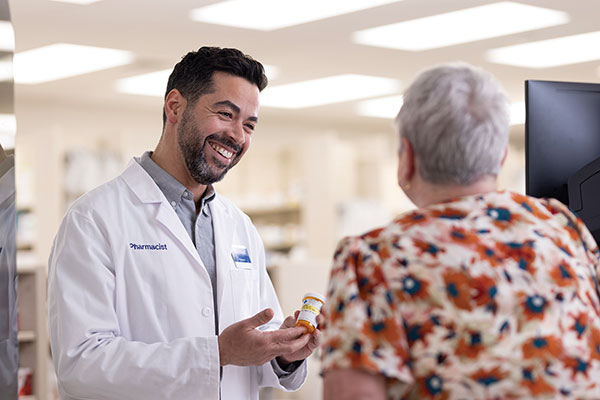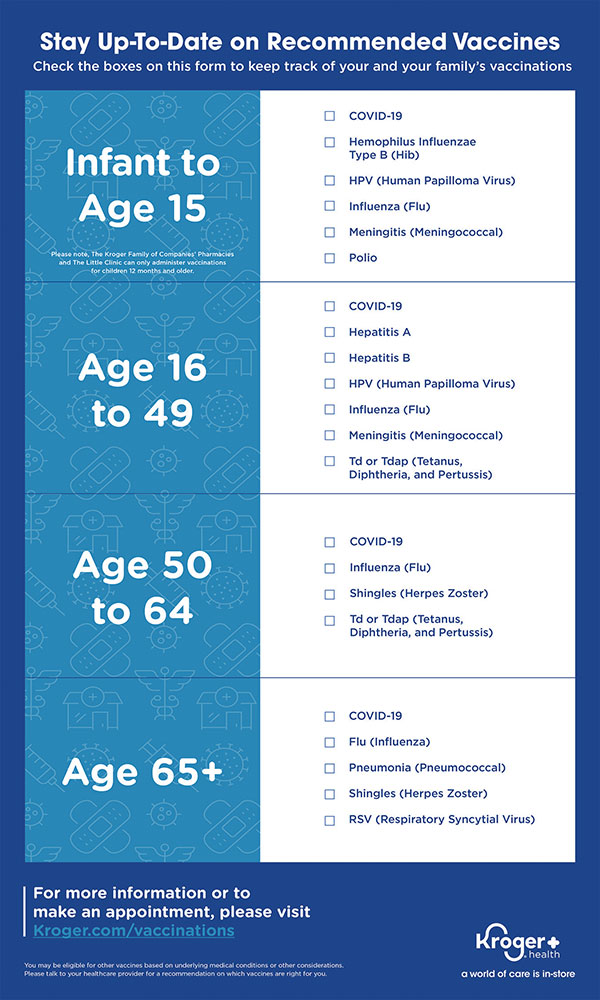Now is a good time to check in and make sure your entire family is protected from infectious diseases.

According to the Centers for Disease Control and Prevention (CDC), vaccines help create protective antibodies that fight off infections. Timely routine vaccinations, such as MMR (measles, mumps and rubeola) and Tdap (tetanus, diphtheria and pertussis), are known to prevent around 4 million deaths annually, yet only 1 in 5 adults are up to date on their vaccines.
Convenience, accessibility and lack of trust all play fundamental parts in why vaccination numbers are low across some demographic groups and geographic regions. Community pharmacies and clinics, such as the Kroger Family of Companies’ Pharmacies and The Little Clinic, have emerged as accessible and convenient options for people seeking needed healthcare services outside of traditional settings. These facilities offer a range of high-quality services, including medication counseling, health screenings and immunizations.
Routine preventive care, including vaccine administration, can take place at various points throughout the year. Certain populations, such as people who are 60 years of age and older, those with chronic diseases and some minority populations, are more at risk for contracting certain infections and are encouraged to maintain updated vaccinations and boosters throughout the year. (For children younger than 5 years of age, check with your local pharmacist or clinician for vaccine guidelines.)
The CDC recommends everyone 6 months old and older get an annual flu vaccine. Influenza, more commonly known as the flu, is a highly contagious respiratory virus that infects the nose, throat and lungs, and could lead to serious illness, hospitalization or death. Dominant flu strains are constantly shifting and protection from a single flu vaccine declines over time.
Retail pharmacies and clinics hold a unique position in the local communities they serve and are deeply committed to vaccine education and outreach. In addition to providing protection against illnesses such as influenza, vaccines also offer protection against hepatitis A, hepatitis B, varicella (chicken pox), measles, RSV, pertussis (whooping cough), COVID-19 and more. By equipping people with consistent, factual information, retail pharmacies and clinics empower them to make informed decisions about their health and the health of their loved ones.
 Research shows schools and colleges have the potential to cultivate a higher disease transmission rate that affects all ages. When students are protected against vaccine-preventable illnesses, they experience fewer absences due to illness.
Research shows schools and colleges have the potential to cultivate a higher disease transmission rate that affects all ages. When students are protected against vaccine-preventable illnesses, they experience fewer absences due to illness.
Ensuring children are current on their vaccines also creates opportunities for parents and caregivers to check their own preventive health statuses. The National Institutes of Health notes vaccine-preventable diseases cost the country approximately $27 billion annually in lost wages and increased healthcare costs.
Unlike some traditional healthcare settings, retail pharmacies and clinics are easily accessible. They are often located within local communities and have extended hours that cater to busy schedules, allowing flexibility for people getting their families vaccinated. Options like the Kroger Family of Companies’ Pharmacies and other retail pharmacies have established vaccine clinics within their pharmacy and clinic locations, making vaccinations a seamless and convenient part of the healthcare experience they provide.
Annual Gallup Polls consistently show pharmacists and nurse practitioners are among the most trusted people in the medical field. Healthcare professionals at retail pharmacies and clinics undergo rigorous training and possess in-depth knowledge about vaccines, proper storage and handling as well as administration techniques.
By prioritizing proactive vaccinations, retail pharmacies create an environment that supports the well-being of students, teachers, staff and families, helping communities live healthier lives.
To learn more, visit kroger.com/vaccinations or visit a local pharmacy or clinic.













